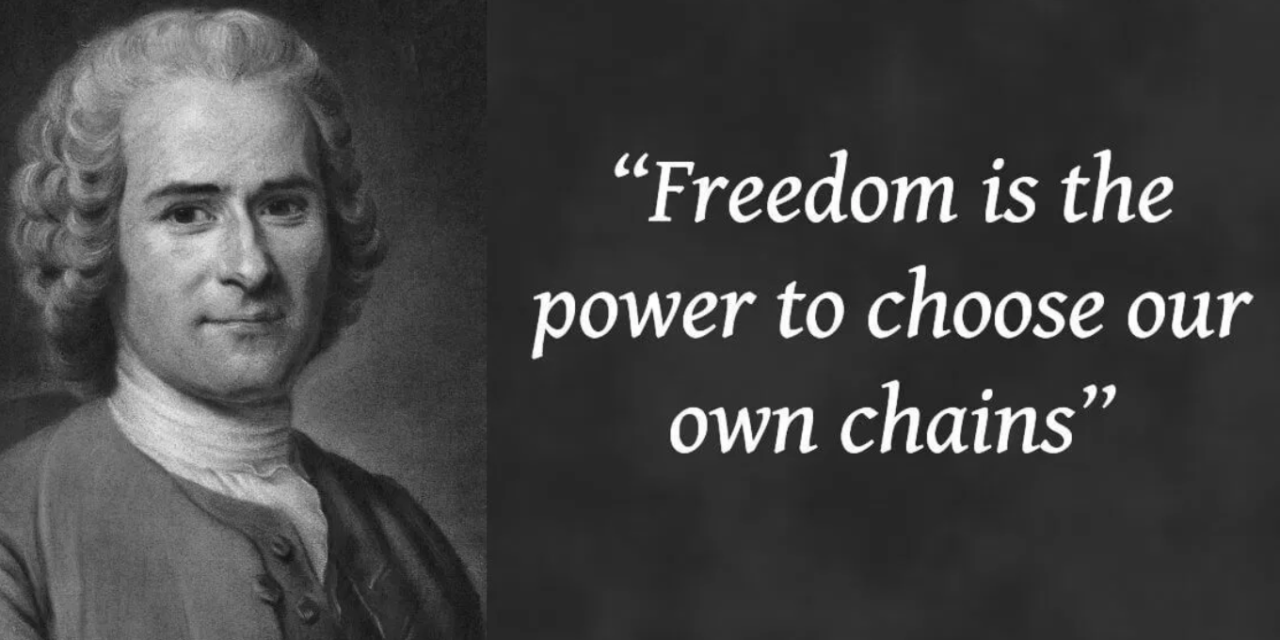The stated aim of The Social Contract is considered to be: “to determine whether there can be a legitimate political authority.” This is a laudable question, given that many forms of governance seem to place people in a state far worse than they would otherwise encounter. What then, is the good, of an organized society, if you lose more than you gain?
Rousseau states, “Let us then admit that force does not create right, and that we are obliged to obey only legitimate powers.” Begging the terrible question of our day and all days, “what powers are legitimate?” The answer is not easy to arrive at, except to say that during the past century, the world has generally come to agree with Rousseau, in that, “the ability to coerce is not a legitimate power, and there is no rightful duty to submit to it.”
Meaning, your capacity for bullying does not equal my requirement to obey.
All of which is fine and good, if I am willing to live with the bullying that will follow, should my chosen society fail to protect individuals from such illegitimate leadership. But, by being born here, there, anywhere…did I choose my society? Or was it mere accident?
Rousseau goes on to say this:
“In this desired social contract, everyone will be free because they all forfeit the same number of rights and impose the same duties on all.” Rousseau explains the absurdity of a man surrendering his freedom for slavery; saying, “the participants must have a right to choose the laws under which they live.”
“…must have a right to choose…“
To my eye, Rousseau is arguing that freedom does not mean you forfeit nothing. Freedom is not the absence of losses of liberty, nor is it a life without obligation to others. Freedom is one thing and one thing only: our inalienable right to choose which laws to live under. Which society to join, if any. Which country to offer our partial surrender and promised duties.
This is arguably codified by the foremost goals of our own (American) constitution, with these treasured words: “We hold these truths to be self–evident, that all men are created equal, that they are endowed, by their Creator, with certain unalienable Rights, that among these are Life, Liberty, and the pursuit of Happiness.
These rights, as so written, and naturally or divinely promised, speak of our right to make the ultimate choice of which society to join, which sacrifices to accept, which obligations to take on. Each for ourselves. And to do this, we must have freedom of movement.
I have never heard a better argument for open borders in my life. From a purely pragmatic perspective, should borders open, and should humans be free to move about as they wish….would not the most successful and desirable “social contracts” naturally attract more people? And those with faulty or poorly contracts, lose them?
We know this would happen, and we know that power moves as the people move. Proof lies in the past century, as The Soviet Union, Red China and North Korea demonstrate(d) perfectly by preventing their captive populations from leaving.
Therefore, if we wish to see social contracts around the world improve, maybe we need only free people up to choose for themselves? Could it be as easy as that? Perhaps the solution to the issue of “immigration” is to simply step aside, open the gates, and let the natural selection of quality social contracts over crappy ones tip the global balance toward a world with truly valuable Social Contracts.
It’s worth consideration, at the very least.


Hi Paul,
Thank you for sharing these thoughts. I believe we are in overall agreement. My article does not really deal with the details of various social contracts. My point, rather, is that allowing people freedom to “vote with their feet” may result in a world filled with increasingly positive contracts.
Americans are often taught about the USSR. It is the western world’s model for “communism” and it is a scary story. The USSR social contract was forced upon whoever was unlucky enough to be born within certain borders; with death, imprisonment or government torture as the penalty for disagreement. AND, if you wish to leave? Nope, sorry. North Korea is a similar example (if not worse).
Of course, we all get it that if you’re being forced to do something (or stay somewhere), the chances are high that you would leave if you could. I mean, who traps their own population? Those who offer an undesirable social contract. Of course, if the USSR social contract had been a success, there would have been no need for the massively weaponized borders, right?
Recently, I traveled through North Macedonia, Montenegro, Bosnia and Croatia…I was there for a month and the story (as expressed to me by literally every single person I spent time with) was that Yugoslavia was a wonderful place to live and grow up. I didn’t know anything about Yugoslavia. As an American Government School student, it just never came up. So, you can imagine my surprise at hearing that it was a communist country….and, you can imagine my further surprise at learning that Yugoslavia had open borders.
Communism is an idea, not a single document with a strict set of rules. Yes, there are documents and books that try to capture the idea of communism and lay claim to how it can (or cannot) be used…but, just as America enjoys a uniquely modern, American version of Democracy (while pointing to its ideological birth in ancient Greece), so could Tito say, “I like these communist ideals and concepts, but I’m going to create a social contract that is quite different from what you see in the USSR.” So, what a surprise to learn that a communist country thrived for decades, during which time its citizens could have packed up and left, if they’d wanted. Instead, they voted with their feet, and they stayed. Why? Because the social contract was acceptable.
Humans are the source of human society. Whether created by God or Mother Nature, humanity is uniquely human. Zebras, for example, do not create human society. Humans do. And, if we allow humans to move freely across the Earth, which many believe God created for all of us, then we will see which social contracts are more or less attractive.
The United States of America are the result of this very premise. Once the “ideas” of America reached the rest of the world (religious freedom, publicly funded education, women’s rights, private property rights, elected leaders, legal representation and a jury of our peers…), what happened? People came. People left social contracts they didn’t like, and they traveled toward one they preferred.
Paul, as you say, it is our inalienable right to freely choose. We are born with and will die with that intrinsic right. No law can remove this right, even though some social contracts pretend to do so. Some even convince their members that it has this power…but there is nothing that can remove each human’s internal self-determination or God-Given free will.
Just consider the impact on North Korea. Open the borders and the humans who keep the North Korean system up and running, will probably leave. The system will falter, as humans move toward the system offered in South Korea (few would flee to China, except to follow other family members who have already escaped over the Chinese border). Then, as North Korea collapses, the people can return to reclaim their ancestral homeland and bring with them…the preferable social contract found elsewhere in the world.
We can use borders, resources, energy, weapons and money to try and control, control, control. Or, we can trust God (free will) and see what happens when people vote with their feet. In my mind, it will simply result in the gradual elimination of poor social contracts while the best social contracts flourish and expand.
Hi Paul,
You know, I’ve heard Howard Zinn’s name (as have many), but I don’t think I’ve ever read anything by him. I have also heard a great deal about Noam Chomsky, but again, have read very little about him. Many of my thoughts come rather directly from my own mind, and I would like to know what you think of my above comment (in reply to your original comment)?
Love,
March
March,
Your thoughts haven’t been analyzed and intentionally misconstrued by right-wing think tanks funded by crank billionaires. Those “malefactors of great wealth” (to quote Teddy Roosevelt) think about the social contract only in terms of the limitations it places on their power to use their vast (and often ill-gotten) resources to constrain *other* peoples’ choices… and find any such limitation on their power unacceptable. “Freedom” for them must be total, even if it severely limits the freedom of all others in society.
So Paul has no idea what argument to put forth in reply to your ideas. It’s not in the “talking points” he gets from Rush Limbaugh (or whoever) and cuts and pastes into all his blog comments. Howard Zinn, OTOH, is a known quantity and *has* been analyzed and intentionally misconstrued by the above political operatives, so Paul has plenty to paste about there!
I’m not even a particular fan of Zinn but still think you should read his ideas directly and form your own opinions, as you always do.
Zinn is known primarily for a single book he wrote, “A People’s History of the United States.” It is still in print and very easy to find: https://www.amazon.com/Peoples-History-United-States/dp/0062397346/ref=sr_1_1?keywords=howard+zinn&qid=1580164668&sr=8-1